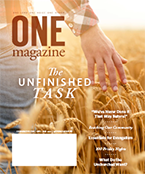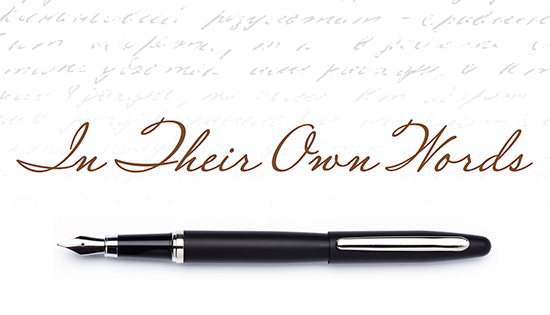
April-May 2020
The Unfinished Task
------------------
|





In Their Own Words, Part Two
By Bill & Brenda Evans
Harrold Harrison grew up in Henryetta, Oklahoma, one of 11 children during the Great
Depression. When Harrold was 28, God “got a hold of” him, as his son Paul said, and never let go. “Dad sold out, trusted God in a radical way.” By 28, Harrold had finished his time in the Navy after 12 major WWII battles. He married Lauretta and began a small wholesale candy business. For the next six and a half decades, he was pressed into the service of the Lord as husband, pastor, teacher, author, book editor, and father of four children. Here is more of his story as told by his children Marilyn, David, Paul, and Jeff.
EVANS: David, you mentioned one of your mom’s Bibles with an inscription dated 1955, two years after your dad’s commitment to the Lord.
DAVID: It was a Christmas present. It says, “Lari, my Loving Wife, December 25, 1955. Within these pages are the Words of Life—may you feast upon them and grow in the grace of God. I pray that as we grow, we might be drawn closer to God, to our fellowmen, and to one another.” He was a loving husband, and wrote Mom beautiful poetry and love letters.
PAUL: You know Dad proposed to Mom on their first date, and they had been married 71 years when she died.
MARILYN: They were opposites but adored each other. She was fun-loving, an only child with a big heart, the outgoing one. She never met a stranger.
JEFF: Mom was a good preacher’s wife, too. She loved to wear hats and was the Candy Lady at church. She also knew how and when to hold her tongue, a good thing for a preacher’s wife.
MARILYN: Dad was quieter, disciplined, strict, and wrote poetry, often to her or about her. He gave her a recipe book in 2006 and wrote a rhymed poem in the front. Dad worked with his hands, too. He was a tinkerer, I guess you would say. He could fix anything: toasters, bicycles, change TV tubes. Never called a repair man. Loved jigsaw puzzles, board games, chess. Made us stilts, and a Chinese Checkerboard. He was known to take us gullible young ones “snipe hunting.” He loved to learn, read, and study. He was a word person, and we children are too. He was all man, but had a softer side, loved pretty things: flowers, poetry, a garden.
DAVID: Garden! When Dad pastored Bethlehem Church in Ashland City, Tennessee, we had a big garden, took care of it with a push plow. No mule, no tractor.
I remember that plow well. I used it a lot.
MARILYN: At first in Ashland City, we lived in a one-bedroom trailer. David and I slept on the sofa. Dad was pastoring but also going to Welch College. One time there was a flood. Somebody came to our door in a motorboat to pick him up, so he could go to class. He was not going to miss. I lost my favorite Beverly Gray book during that flood—dropped it out the front door into the muddy water. But I also learned 100 Bible verses in that trailer. Dad typed them on index cards to memorize for a class. I practiced with him—verse on front, reference on back—and memorized them, too. I still have those index cards.
EVANS: Jeff, you said your dad was serious about the Bible.
JEFF: Dad walked his talk. When I was young, Dad said the Bible was a special kind of book because whatever I dealt with, there was a principle in the Bible to address it.
PAUL: Dad’s faith revolutionized his life. In the military in the 1940s, he had picked up the habit of smoking, so when he was newly converted, he went to church with a pack of cigarettes in his shirt pocket. He began to teach a class of young boys, and one Sunday the lesson material instructed him to tell those boys not to smoke. He thought, “I can’t tell them not to smoke with a pack of cigarettes in my front pocket.” At the time, he had a small wholesale candy business and made deliveries to various stores. He decided he would eat a Snickers™ bar whenever he felt the urge to smoke. The first day of his plan, he ate 24 Snickers but did not light one cigarette. He never smoked again.

EVANS: Sounds as if your dad was a practical man and a teacher with both his hands and his heart.
MARILYN: He was. He built things, fixed things, but he also taught me how to drive. He was good at it. Told me to think about how to keep safe. Later, when I was working—it was around 1966—I had my eye on a yellow Chevrolet Biscayne. Stick shift, three gears on steering column. He went with me to the Chevrolet place on Broadway in Nashville to negotiate. He and the salesman got it down to $75 apart, but Dad wouldn’t budge. He got up like we were going to walk out. I jumped in, “Daddy, I’ll pay the $75.” He told me later, “Marilyn, if you had just waited, I could have got him down.”
EVANS: What about your dad’s years at Randall House, both as a teacher and editor? Talk about those years.
DAVID: Dad went and went and went and went.
JEFF: He was gone a lot. I sometimes went with him.
MARILYN: Dad later told us that his only regret about those days was that he put his work for the Lord and the church before his family.
DAVID: I also went along sometimes. He taught ETTA courses (Evangelical Teacher Training Association) when he started with Randall House. Dad was a man of vision, so focused as an ambassador for the Lord and our denomination. “I’ve got to teach our people how to teach,” he told me. He wanted to build up Randall House as well. He had started a Bible institute in Florida when he pastored in Chipley and caught the eye of people in Nashville. So, when he went to Randall House, he was able to play a pivotal role as teacher, writer, and editor. He was in the right time, the right place.
PAUL: In his earlier days at Welch from 1955-1959, Dad had done well. He was second in his class on the Bible knowledge exit exam seniors had to take back then. Dad was a reader and learner. Later, he earned a master’s degree at Middle Tennessee State University and Belmont, and would have liked to earn his doctorate. As a learner, I think Dad enjoyed “the hunt.”
DAVID: He told me that one of his great joys was working as associate editor with Dr. Robert Picirilli on the Randall House Commentary series. It was a huge project.
PAUL: In fact, Dad retired from Randall House one day and the very next day went to work for Welch College. Dr. Picirilli hired him to oversee the college’s Extension Program, as it was called in those days—earning college credit by long-distance learning.
EVANS: We visited your dad at Vanderbilt University Hospital three days before he died. He was about to be transferred to hospice. He seemed calm, so tranquil, a man of peace who was at peace.
PAUL: He was. Dad lived for some years with a “Triple A” as the doctors called it—an abdominal aortic aneurysm. It ruptured but caused limited bleeding at first. I asked him, “Dad, do you know what your condition is?” “No” he said. “Would you like for me to tell you?” “Yes,” he said. I sat on his bed, held his hand, looked into his eyes, and told him it might be a few minutes or a few days, but this was going to take his life. He took in my words and calmly said, “I’ve faced death before.”
EVANS: At peace to the end.
PAUL: Dad had trusted the Lord since he was 28. At age 94, he trusted the Lord in death.
About the Writers: Bill and Brenda Evans live in Ashland, Kentucky. You may contact them at beejayevans@windstream.net.
|
|

